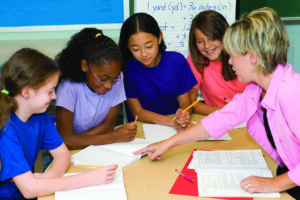Summer holidays and https://argoprep.com/blog/k8/go-math-grade-7-vs-argoprep-grade-7/ have always been a headache for teachers. What has been accumulated over the course of a year is eroding and a lot has to be repeated anew. The last academic year ended in the mode of a global experiment: they did not have time to finish the program, as they began to forget what they had passed. Therefore, in September, the students will have to get to know each other and learn to learn.
You have to start over
Coming to school in September is exciting for many reasons. One of them — https://argoprep.com/blog/k8/go-math-grade-6-vs-argoprep/. First graders master the space of relationships with new people, get used to offices and corridors. Pupils in grades 2-4 join the educational process after a long break, rebuild relationships with each other, and gain authority in the class.
This year, instead of three months, the guys spent five whole months outside of school. The preschoolers did not manage to finish the training courses, and the first graders just got used to it, as everyone was transferred to distance learning. The adaptation gains were down the drain.
You have to restore skills and return motivation
In elementary school, children learn to write, read and count. These skills need to be trained regularly, otherwise they are quickly lost. If students usually forget up to 30% of what they have learned over the summer, then due to the pandemic, the amount of residual school knowledge has become even lower.
At the end of the last academic year, the students had just begun to focus on the result, when a distant happened. In the stressful environment of remote study and work, parents cursed, teachers criticized. The schoolchildren did not understand why they should strive to complete assignments, if in the end everyone was still unhappy.
How to support your child
Pupils were required, but almost not supported – for sensitive students this was a blow to motivation and self-esteem. Our experts advise on how to help students return to school.
1. Be prepared to do extra
Parents need to be ready to additionally work with the child. The point is not that he is not able to do something or does not know. He simply lost the habit of the mode of study, the rules of conduct at school and lost the skills of self-organization. The student may forget or forget how to collect a portfolio, keep a diary and retreat cells in a notebook. It is important that you are on the side of the child: with your help, the student will learn the necessary material and learn how to complete the assignments, just be patient.
2. Remind about the successes of the past year
If a child refuses to go to school, you should not overpersuade that it is “cool” and “you will talk to the guys, everyone misses you so much.” Your child may feel that something is wrong with him if he does not share your feelings. It is better to recall the successes of the last year, when the child felt confident: performance at a literary competition, the first long-awaited “five” for dictation, participation in the relay race, New Year’s concert, a trip to an excursion.
3. Let your child walk at their own pace.
You may have to grow the experience of success from scratch: start small and gradually move forward. It is important here not to rush things, but to let the child go at his own pace. For example, in 2 minutes he solved 10 examples, and tomorrow it will be less or the same. If the smallest gains are maintained, the results will be higher after 3-4 days. When a parent has high expectations, the child feels that it does not correspond to them and gives up.
4. Take on some of the tasks
Remember the principle “not everything, not all at once and not alone.” Take on some of the tasks temporarily. Remind me to take a shift and a phone with you, check how the portfolio is folded and the gym form is assembled, count the cells. Hand over responsibility as the child has the strength to become more independent.
5. Support your child
Teach your child to distinguish between the assessment of his personality and his work. Grades are given from grade 2 at school, and this can be painful for children. It’s good when the teacher says “you are talented, it’s just that this job didn’t work out right now.” It is important for honors and good students to show that grades are only one of the indicators of success. If grades are treated differently at school than at home, continue to support your child and show their strengths.
6. Reconnect with friends
Help the children establish communication before class begins. In grade 3-4, schoolchildren grow rapidly, change externally and psychologically. Someone has been on a trip, someone has become a blogger, someone has a brother or sister – everything has changed and now you need to get to know each other again. It’s great if the parents of the class organize a joint walk or invite the children to play board games.
7. Don’t ask too much
At the beginning of the year, schoolchildren will show their leadership qualities, set boundaries, and build relationships. If someone is rejected, it will be an ordeal for him. No amount of lessons and assignments will captivate a child who is going through the drama of losing friendship. In this situation, one should not demand educational achievements. It is better to help the child find a company with the same interests and feel more confident. If the child is applying for academic leadership, and there is high competition in the class, additional lessons with a tutor will help.
8. Don’t give in to emotions
For the last quarter, children studied at home under the supervision of their parents. So some mums and dads worry about how well they did. The fear that the child will be lagging behind makes us wait for better results from the child. It is important not to succumb to emotions and seek help from a psychologist so as not to blame your problems on the student. Another way to objectively assess the situation and calm down is to give the student a test in various subjects. On a free trial lesson in Tetrika, you can check if there are gaps in your child’s knowledge and understand what to look for.
9. Evaluate the curriculum
In grades 1-2, they study basic concepts and it is not difficult to make up for the program. In grades 3-4, the volume of material increases: different types of tasks, parts of speech, phonetic and morphological parsing of words appear, but this is not a reason to panic. If you find the gaps in time and start practicing, the child will have time to do everything. Experience shows that a 9-10 year old child is able to make up for the entire primary school curriculum in one academic year.
10. Work with motivation
At the age of 9-10, independent motivation to study is formed and children ask themselves the question “why should I teach this?”. Teachers in a mass school rarely pay attention to such issues and try to quickly return to the topic of the lesson. If the student does not receive an answer, the question does not disappear, so the parent needs to find the right words, and not dismiss the child. Help the student see the connection of the subjects being studied with the real world, or even better, think together. It will be easier for a child to emotionally accept the answer found if he did not hear it from you, but thought for himself.
